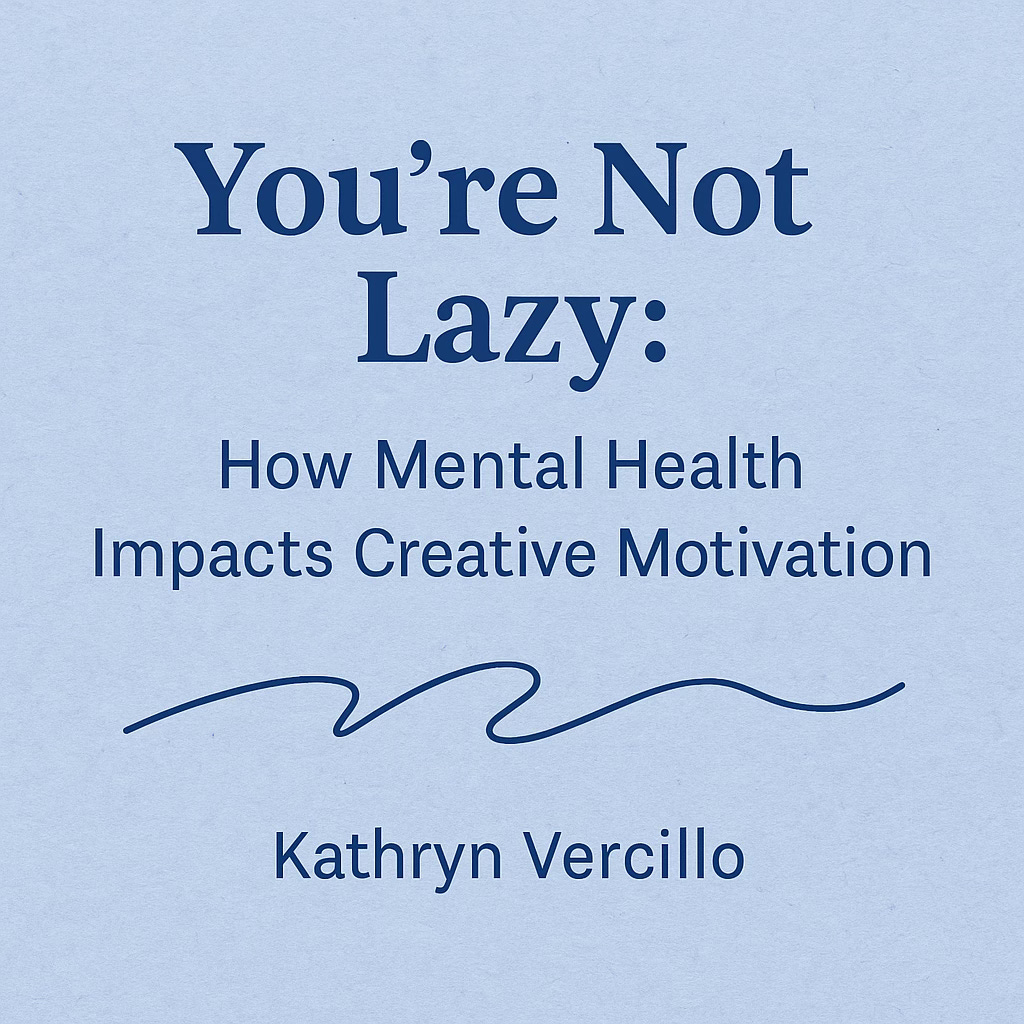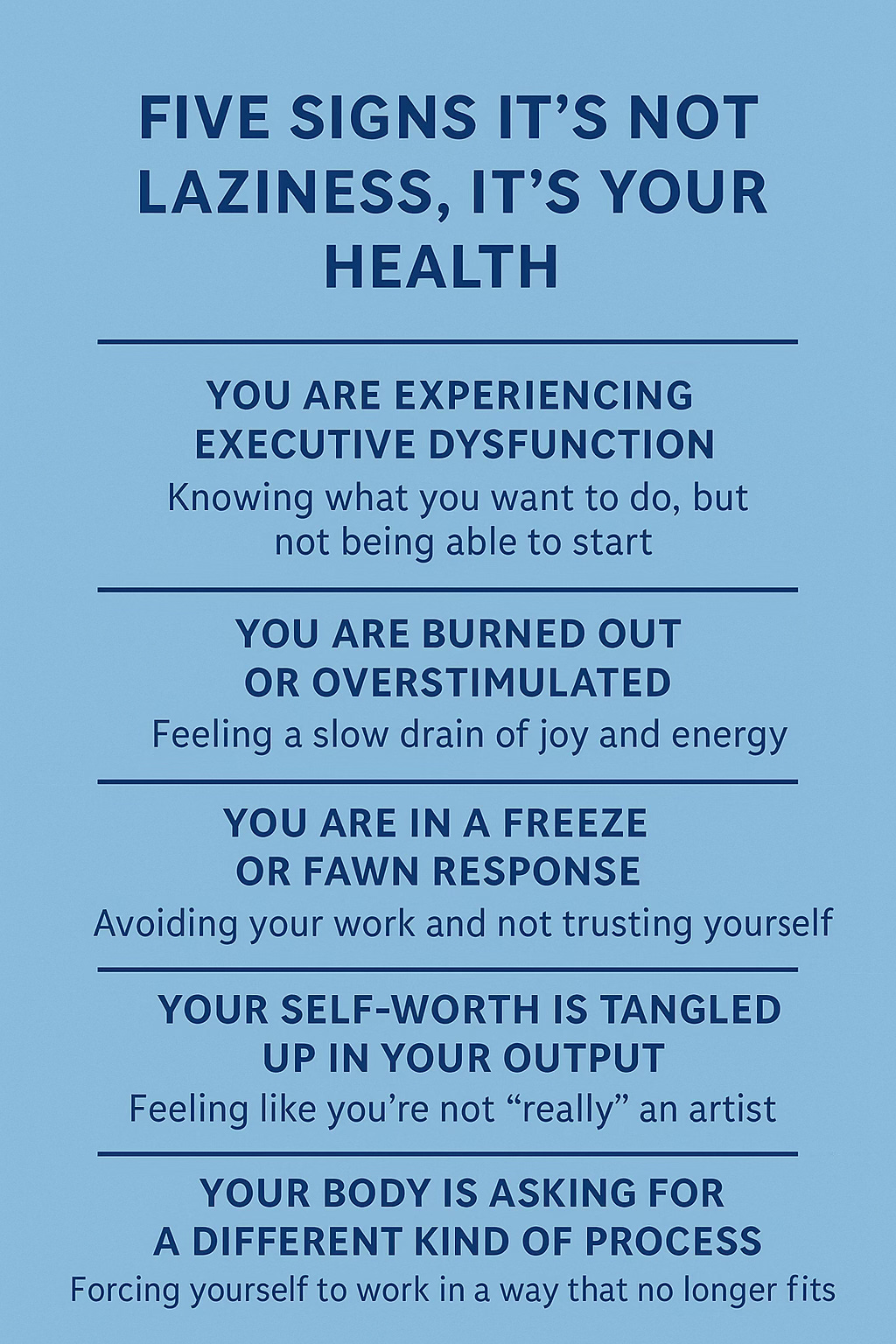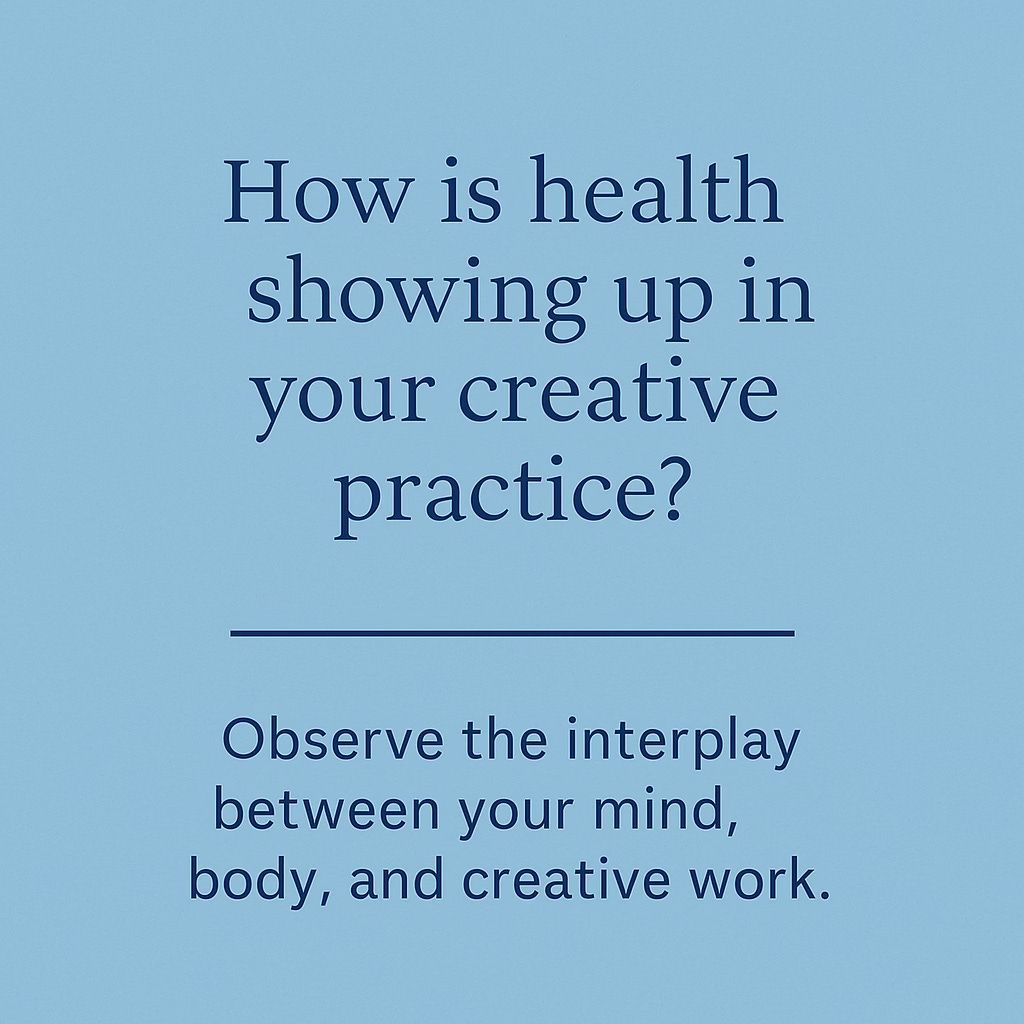You’re Not Lazy: How Mental Health Impacts Creative Motivation
Redefining resistance, fatigue, and creative inconsistency through a compassionate lens
I hear it from clients all the time. I’ve said it to myself, too.
“I know I should be writing but I just can’t make myself do it.”
“I feel like such a fraud. I talk about art like it matters, but I haven’t touched my supplies in months.”
“I’m so lazy. Why can’t I just sit down and make something?”
This is one of the most painful lies creatives tell themselves. And it is also one of the most common. We equate a lack of output with a lack of discipline, drive, or worth. We assume that because the urge to create isn’t showing up on command, it must be our fault.
But if you are someone living with anxiety, depression, chronic illness, ADHD, trauma, or burnout, then “laziness” probably isn’t the right story. In fact, it may be a complete misdiagnosis of what’s really happening inside your body and brain.
Let’s talk about what’s actually going on.
I have developed these ideas after decades of lived experience, interview-based insights, and deep research into the complex relationship between art and health. They are based on my unique 6-part framework. If you are interested in assistance in applying these ideas to your own life: Order a Creative Health Assessment or Book a 1:1 Coaching Call.
Creative Motivation Is Not Just a Mindset Issue
We are taught to think of motivation as a matter of willpower. If you want it badly enough, you’ll make it happen. But that belief ignores how mental health, nervous system regulation, and energy capacity work. It ignores the impact of symptoms like fatigue, brain fog, executive dysfunction, and emotional overwhelm. It ignores the toll of trying to function in a world that doesn’t accommodate you.
I have spent years fighting with my own “inconsistency.” As a professional writer, I could meet deadlines with military precision when the stakes were external. But when it came to personal projects, my creative drive came in unpredictable waves. There were times I would sit at my desk and cry because I wanted to write but could not find the thread. There were times when I finished something and immediately forgot how to begin again.
I now understand that this wasn’t laziness. It was an overtaxed nervous system trying to survive.
Five Signs It’s Not Laziness, It’s Your Health
You may be navigating one or more of the following without even realizing how deeply they affect your creative motivation:
1. You are experiencing executive dysfunction
This often shows up as knowing exactly what you want to do, but being unable to initiate it. You have the idea. You have the skills. But your brain won’t bridge the gap between wanting and starting. This is common in ADHD, depression, and anxiety.
What it feels like:
You keep staring at the project but not starting
You spend more time planning than doing
You freeze instead of moving forward
2. You are burned out or overstimulated
Burnout doesn’t always look like collapse. Sometimes it shows up as a slow drain of joy and energy. You might still be functioning in other areas of life, but your creative spark feels dull or absent. Sensory or emotional overstimulation can also block access to creative flow.
What it feels like:
Your ideas feel flat, repetitive, or uninteresting
Even thinking about making something feels exhausting
You are consuming more than you are creating and feeling stuck in that loop
3. You are in a freeze or fawn response
When the nervous system perceives a threat (whether physical, emotional, or psychological) it can trigger a freeze state. For creatives, this often means we shut down around our work. We stop trusting ourselves. We avoid the desk or the sketchbook, not because we don’t care, but because we are in a protective state. I tend to freeze or fawn, and I’m happy to tell you more about it.
What it feels like:
You avoid your art supplies completely
You feel numb or detached when trying to create
You downplay your ambitions or shrink your goals to “stay safe”
4. Your self-worth is tangled up in your output
If you only feel like an artist when you’re producing work, then every period of rest, pause, or disconnection can feel like an identity crisis. You start telling yourself that you’re not “really” a writer or an artist anymore. That story becomes a weight. And that weight makes it harder to return to the work.
What it feels like:
You feel embarrassed to call yourself creative
You compare yourself to others constantly
You question your value whenever you’re not producing
5. Your body is asking for a different kind of process
Sometimes your health changes, but your creative habits don’t. You try to force yourself to work the way you always have, even though your energy, mobility, or focus is different now. This mismatch can create resistance. But when you adapt your process—changing your medium, your pace, your expectations—you create space for your creativity to meet you where you are.
What it feels like:
Your usual process feels like too much
You ignore physical signals to push through
You avoid creating instead of adjusting the process
Reframing the Struggle: It’s Not a Character Flaw
The shift happens when you stop asking “What’s wrong with me?” and start asking “What’s happening for me right now?”
That question changes everything. It invites compassion. It opens up space for curiosity. It lets you respond to your needs instead of punishing yourself for having them.
I often recommend journaling or reflective craftwork as a way to meet yourself gently. In Hook to Heal, I wrote about how the smallest moments—just holding yarn, making a single stitch, or jotting down a sentence—can reawaken the creative self without pressure or performance.
This is not about giving up on your work. It is about giving up on the idea that it only counts when it looks impressive, optimized, or constant. Your creative life is still alive, even when it is quiet.
You Don’t Have to Figure This Out Alone
If any of this sounds like your story, I want to invite you into a different kind of conversation. In my 1:1 Creativity and Wellness Sessions, we explore how health and creativity interact in your life and what kind of support, rhythm, and reframing you might need right now.
These sessions are not productivity hacks. They are permission-based, spacious, and grounded in psychology, expressive arts, and lived experience.
If you’ve been telling yourself you’re lazy, let’s unpack that story together. There is something more true underneath it. And that truth can become a doorway back into your creativity.
Sessions are held over Zoom, with alternative formats available (email/text-based coaching for those who prefer it).
Don’t see a time that works for you? Send me an email and we’ll work something out.
ZOOM ALTERNATIVES NOTE: these are designed as hour-long Zoom sessions. However, everyone’s needs and communication preferences are different, and I am happy to work with you in alternative ways including via an exchange of emails or text messages. Email me to figure out what works best.
A Prompt to Close
Think of a moment this week when you avoided your creative practice. Instead of judging it, ask:
What might I have needed in that moment that I didn’t know how to give myself?
Sit with the question. Let it guide you, not shame you. This is how reconnection begins.
Not ready to book a session but want to keep getting tips?





Thank you for this. I guess I'll need to change my process (again). Now, I just need to find de brain power to figure it out...